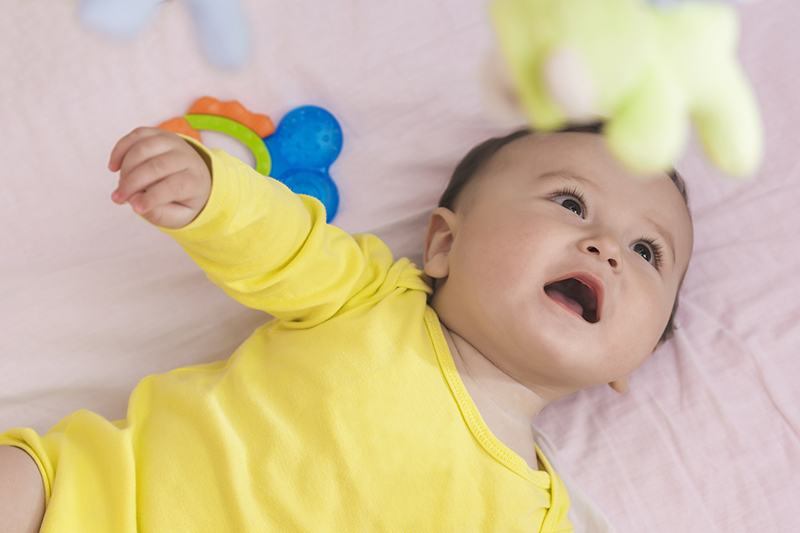Families For Life | Movement: Newborns

DID YOU KNOW?
Cradle cap is the oily, scaly crust that babies sometimes get on their scalps, in their body folds and on their torsos. Although cradle cap looks uncomfortable, it doesn’t usually bother your baby.
READ MORE

Play is how babies learn and develop in all areas, including movement. Through play, you can give your baby lots of opportunities to develop movement and motor skills.
About newborn movement and play
Your baby is born ready to experiment with movement. Play is one of the main ways that he learns about what his body can do and develops his movement skills.
Newborn play is simple, but it has an important purpose – through play, your newborn starts to work out how she can interact with her environment. For example, when you hold a toy close to your baby and she reaches for it, your baby discovers that she can move her arms to touch nearby objects.
Play also gives your newborn lots of practice at moving different parts of his body, which helps develop his gross motor skills and muscles.
Give your baby lots of encouragement and praise, and be amazed at what your baby can do. This makes your baby feel loved and valued, and builds the confidence your baby needs to try lots of new movements.
What to expect: newborn movement
In the first eight weeks of life, your newborn baby has little control over her movements. For example, when you stroke your baby’s cheek, your baby turns by reflex to that side to suckle.
As your baby starts to gain more control of his movements, you’ll find that your baby might:
uncurl his fists and swipe at dangling objects
lean on his elbows and lift his head while lying on his tummy to look at a toy in front of him, around 4-8 weeks
follow your face or a slowly moving toy with his eyes by around six weeks. You might need to be quite close – about 30 cm away – for this to happen
move and kick his legs, especially in the bath or when out of a diaper, around two months
wave and watch his hands and feet or move his hands towards your face or a toy, around three months.
Your baby will be keen to copy your facial expressions almost from birth. If you give your baby a big, bright smile, she’ll try to do the same. Frown – and you’ll see that coming back at you too!
Play ideas to get your newborn moving
Here are some play ideas to get your newborn moving:
Put a toy or rattle in your baby’s hand for your baby to hold
Dangle some fun, bright objects in front of or above your baby to encourage him to reach. You can put toys within easy reach by attaching a frame over a pram or bouncer and hanging toys from it
Sing nursery rhymes with simple actions that your baby can copy
Give your baby tummy time. Put your baby on her tummy on a firm surface – like the ground – so she can practise raising up on her elbows and lifting her head. Start with 1-2 minutes and build up to 10-15 minutes a day
Give your baby time to play on the floor and move his body. Try not to rush him into doing things before he’s ready. Just enjoy watching him play.
Some babies might not like tummy time at first. If your baby is unhappy on her tummy or being on her tummy makes her vomit, try putting your baby on your tummy or chest. This can be more comfortable for your baby and lets her see your face. You can try doing tummy time on a firmer surface later.
Concerns about baby development
Babies develop at their own pace. In general, the key events in baby development happen in a similar order, but the age they happen might vary for each child and even for children in the same family.
But you know your baby best, so if you have concerns about your baby’s development, including his movement and play, it’s a good idea to see your paediatrician or General Practitioner.
This is particularly important if you’ve noticed that your baby:
doesn’t seem to be able to do the things she could do earlier
seems unusually floppy or stiff
doesn’t startle when there’s a loud noise nearby
doesn’t seem interested in you.
© raisingchildren.net.au, translated and adapted with permission
Explore more